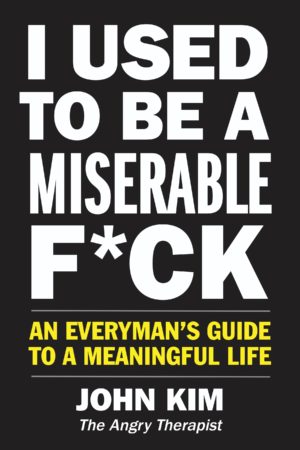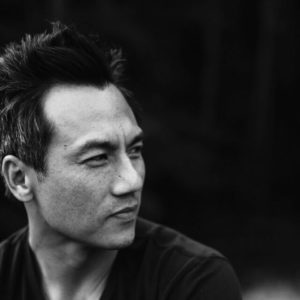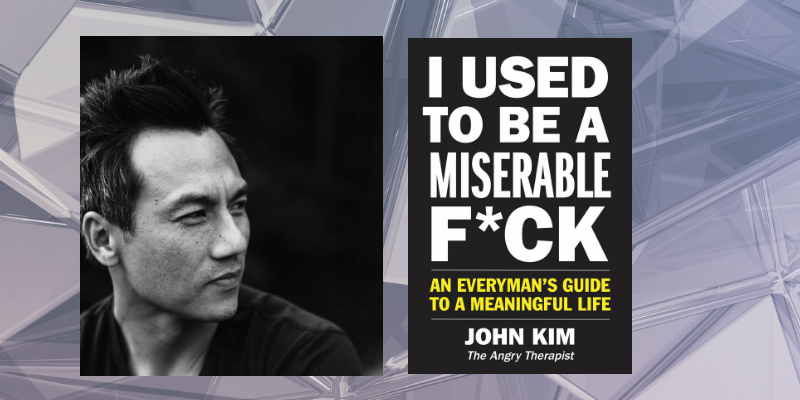Interview by Jane Manaster


John Kim is also known as The Angry Therapist. He’s a licensed therapist who has helped thousands of men find more happiness in their relationships and more purpose in their lives. He does so in unconventional ways, like by seeing clients at coffee shops, on hikes, or in a CrossFit box. You can check out his podcast, Instagram, and more about him here. His new book is I USED TO BE A MISERABLE F*CK: An Everyman’s Guide to a Meaningful Life [HarperOne; February 2019].
John Kim will be doing an event at Books, Inc. in San Francisco on February 4th.
Jane Manaster: In considering your personal experience, and having friends who are divorced, does divorce affect men and women differently in terms of their social status?
John Kim: Although I think it’s changing, I believe society still judges women more for being divorced more so than men. The cultural and religious pressure for women to be “pure” still exists today, and many women internalize this and believe they are less than or defective because they are divorced.
JM: How do you anticipate your book will impact recovery from divorce, after both short-term and long-term marriages?
JK: Since my book follows my own divorce recovery and journey, I believe it will give others going through divorce hope as well as a roadmap. I believe it will challenge men to redefine themselves and their definitions of what a man looks like. And women to reexamine their standards and the kind of men they want to love.
JM: In what ways do you think admitting anger and misery is beneficial to others who are experiencing a new marital status?
JK: We have all been miserable and angry at one time or another. And admitting how we’ve felt and where we’ve been only humanizes us. It’s denying our feelings and ripping out our chapters that only makes us more miserable and angry. It’s imperative our partners know our truth. Because nothing can be built without it.
JM: Will the book be more helpful to those who have been through the same distress as you have, or to those experiencing it from different perspectives (eg. women, younger/older, what have you)?
JK: I think the book will be helpful to anyone who has been in a dark place. It doesn’t matter if you’re a man or woman. Although I have written it for men, it’s a guide for humans. For anyone who wants to change their lives and live more of a meaningful one.
JM: Can you give a demographic profile of your targeted readers?
JK: My demographic is men who don’t usually read self help. Men who know they need a change but are turned off by the stigma of self-help books, men who want to be better but don’t know where to start. My demographic is also women are sick and tired of shitty relationships and want better, who need a guide or at the least a reminder of what kind of men they should be looking for if they want to build something healthy and sustainable.
JM: What racial and ethnic differences do you see in the expression of negative emotions?
JK: Being Korean, I was raised to believe that men are not supposed to show emotions. Men are not supposed to express their feelings. They’re supposed to work and build things. Culturally Korean men, especially from my dad’s generation, are reactive and angry. They never learned tools to accept and control their emotions. And this is passed down through the generational transmission process, from father to son, from father to son. And this needs to stop.
JM: In what way do you see book’s title as a possible turn-on or turn-off to possible readers?
JK: When my publishers wanted to call my book I Used To Be A Miserable Fuck, I said no. I had resistance. I didn’t want people to think I was jumping on the “fuck” train and was afraid that it would be a turn-off. Many may see this book as just another self-betterment book using the word “fuck” as a sales pitch. But as I sat with it, I realized that my resistance was more due to the fact that I’m embarrassed to announce that I used to be miserable because therapists aren’t supposed to be miserable. That’s when I realized it must be the title.
JM: You address a range of topics in the book. Are you concerned the range of topics could confuse or overwhelm readers?
JK: I’m not concerned with the range of topics. I think there’s a lot to cover when it comes to life and relationships. The sixty six “dos” and “don’ts” line up with my story and were essential in no longer being a miserable fuck.
JM: Why is humor helpful?
JK: Nothing slices faster than humor. It builds trust. Self-betterment doesn’t have to be so serious. And finally, it reminds us that we are all human.
JM: What is your writing schedule and how do you fit it in with your day job?
JK: I write in sprints. I thread writing into my day. It just becomes a way of life. Not a job. I wake up and get to a coffee shop as fast as I can. Knock out a couple hours. Then I go sweat or do something physical. Then do some different kind of writing. If I worked on a book in the morning, it would be a blog in the afternoon. Or visa versa. I work in sprints, switch it up often, and turn it into a lifestyle.

